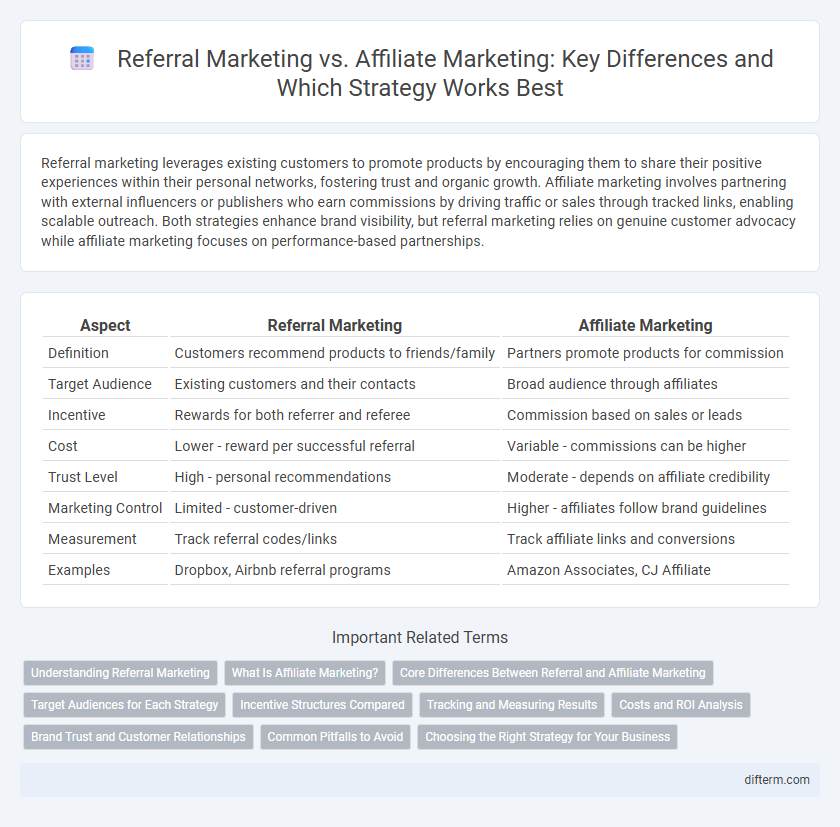Referral marketing leverages existing customers to promote products by encouraging them to share their positive experiences within their personal networks, fostering trust and organic growth. Affiliate marketing involves partnering with external influencers or publishers who earn commissions by driving traffic or sales through tracked links, enabling scalable outreach. Both strategies enhance brand visibility, but referral marketing relies on genuine customer advocacy while affiliate marketing focuses on performance-based partnerships.
Table of Comparison
| Aspect | Referral Marketing | Affiliate Marketing |
|---|---|---|
| Definition | Customers recommend products to friends/family | Partners promote products for commission |
| Target Audience | Existing customers and their contacts | Broad audience through affiliates |
| Incentive | Rewards for both referrer and referee | Commission based on sales or leads |
| Cost | Lower - reward per successful referral | Variable - commissions can be higher |
| Trust Level | High - personal recommendations | Moderate - depends on affiliate credibility |
| Marketing Control | Limited - customer-driven | Higher - affiliates follow brand guidelines |
| Measurement | Track referral codes/links | Track affiliate links and conversions |
| Examples | Dropbox, Airbnb referral programs | Amazon Associates, CJ Affiliate |
Understanding Referral Marketing
Referral marketing leverages existing customers to promote products or services by encouraging them to share their positive experiences with friends and family, fostering trust and higher conversion rates. Unlike affiliate marketing, which relies on external partners earning commissions for driving sales, referral marketing emphasizes personal relationships and genuine endorsements. This approach enhances brand loyalty and creates cost-effective, organic growth through word-of-mouth recommendations.
What Is Affiliate Marketing?
Affiliate marketing is a performance-based marketing strategy where businesses reward affiliates for driving traffic or sales through their promotional efforts, typically via unique tracking links. Affiliates, often bloggers or influencers, promote products or services to their audience and earn commissions for each conversion resulting from their referral. This method leverages online platforms and digital channels to extend brand reach and generate measurable revenue growth.
Core Differences Between Referral and Affiliate Marketing
Referral marketing leverages existing customers to promote products through personal recommendations, often rewarding them with discounts or credits, emphasizing trust and relationship-building. Affiliate marketing involves third-party publishers promoting products via tracked links in exchange for commissions, focusing on wider reach and performance-based incentives. The core difference lies in referral marketing's reliance on customer advocacy driven by personal connections, while affiliate marketing prioritizes external partnerships and scalable reach through paid promotions.
Target Audiences for Each Strategy
Referral marketing primarily targets existing customers who have experienced a product or service firsthand, leveraging their trust and personal networks to generate new leads. Affiliate marketing focuses on external partners, such as bloggers, influencers, or niche websites, who promote products to broader or more specific audiences beyond the brand's direct reach. Understanding the distinct target audiences helps businesses tailor incentives and communication strategies to maximize engagement and conversion rates in each marketing approach.
Incentive Structures Compared
Referral marketing typically relies on personalized rewards such as discounts, exclusive access, or service credits to motivate existing customers to recommend products to friends, fostering trust through personal endorsement. Affiliate marketing employs a commission-based incentive model, offering affiliates monetary compensation tied directly to sales or leads generated via tracking links, which drives performance-based promotion. The key distinction lies in referral marketing's emphasis on nurturing genuine customer relationships, whereas affiliate marketing prioritizes measurable, ROI-driven partnerships with external promoters.
Tracking and Measuring Results
Referral marketing and affiliate marketing rely heavily on tracking systems to measure campaign effectiveness, using unique referral codes or links to attribute conversions accurately. Advanced analytics platforms enable marketers to monitor key performance indicators such as click-through rates, conversion rates, and customer lifetime value, ensuring precise measurement of ROI. Real-time tracking and comprehensive reporting help optimize strategies by identifying high-performing affiliates or referrers and adjusting incentives accordingly.
Costs and ROI Analysis
Referral marketing typically incurs lower costs as it leverages existing customers to promote products organically, resulting in higher ROI due to trust-driven conversions. Affiliate marketing involves paying commissions to external partners, which can increase upfront expenses but offers scalable customer acquisition opportunities with measurable ROI. Analyzing cost-per-acquisition (CPA) and lifetime value (LTV) reveals referral programs often yield more cost-effective growth, while affiliate marketing provides broader market reach at a variable investment level.
Brand Trust and Customer Relationships
Referral marketing strengthens brand trust by leveraging genuine customer recommendations that create authentic connections and foster loyalty. Affiliate marketing expands reach through strategic partnerships, but may lack the personalized endorsement that deepens customer relationships. Building trust relies on the credibility of referrals, making referral marketing a powerful tool for long-term customer engagement and brand advocacy.
Common Pitfalls to Avoid
Referral marketing and affiliate marketing often suffer from unclear program structures that confuse participants and reduce engagement. Neglecting to track and attribute referrals accurately can lead to lost revenue and unfair reward distribution. Failing to nurture relationships with referrers or affiliates weakens trust, undermining long-term program success.
Choosing the Right Strategy for Your Business
Referral marketing leverages existing customers to promote your brand by encouraging them to share their positive experiences, resulting in high trust and cost-effective customer acquisition. Affiliate marketing involves partnering with external influencers or publishers who earn commissions for driving sales or leads, offering broader reach and scalable growth potential. Selecting the right strategy depends on your business goals, target audience, and budget, with referral marketing suited for strengthening customer loyalty and affiliate marketing ideal for expanding market presence.
Referral marketing vs affiliate marketing Infographic

 difterm.com
difterm.com